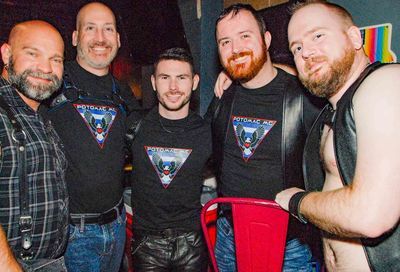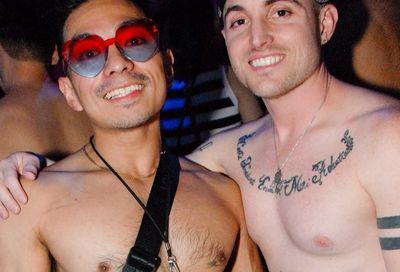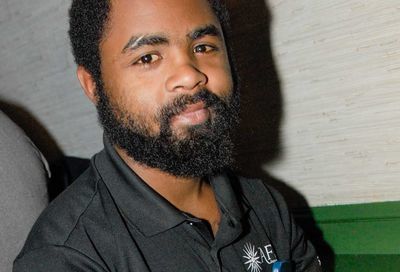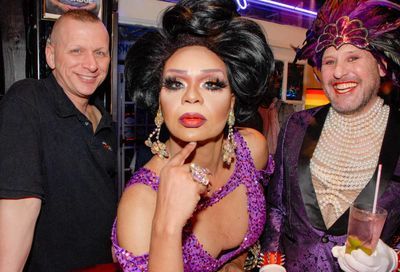Chorus Girl: The Gay Men’s Chorus of Washington’s Thea Kano
Thea Kano ushers in a new, exciting era as the first female head of the Gay Men's Chorus of Washington

“What do you think they’d want with me?”
While finishing her doctorate in choral conducting at UCLA, a gay friend told Thea Kano that the Gay Men’s Chorus of Washington was looking for an assistant director. But as a straight woman, she wasn’t sure if she was the right fit.
Was she ever.
Recalls David Jobin, a former executive director of GMCW, “People often commented during Thea’s tenure as the Associate Artistic Director that their favorite moments and songs in a show were those where Thea was at the podium.” Furthermore, with Kano at the helm, Jobin boasts that GMCW’s select vocal ensemble Rock Creek Singers was “hailed as the best moment … and best musicianship” at the 2012 conference of the Gay and Lesbian Association of Choruses, or GALA Choruses.
Naturally, Jobin, who worked with Kano during his four-year tenure, was thrilled to hear of Kano’s selection earlier this year as GMCW’s artistic director. “She has a successful career in New York. I wondered if she would even apply for the job,” he says, referencing the New York Master Chorale, which Kano founded a decade ago and leads to this day.
Kano, 49, was promoted after a national search that turned up a strong pool of candidates — most of whom were gay men. Were there any reservations about hiring a straight woman for the job? Ultimately no, says Chase Maggiano, GMCW’s current executive director. “The stock answer, honestly, is we’ve been spending 34 years fighting for equality. Who are we to turn our backs on that word right now? It wouldn’t be fair to our legacy and our history as equality fighters. And frankly, it wouldn’t be fair to Thea, who has been a gay rights advocate for most of her life. What we were looking for was the best person for the job. We found it.”
Taking over for Jeff Buhrman, who served as GMCW’s artistic director for 13 years, Kano is the first heterosexual and first woman to lead the organization. “I can’t say that I know of another straight woman conducting a men’s chorus but there certainly could be,” says Robin Godfrey, executive director of GALA. “The primary concern of our choruses is artistic excellence, and that means hiring the conductor they feel has the best chance of taking the chorus where they want to go artistically — regardless of gender or sexual orientation. Conducting a gay chorus certainly requires someone who is supportive of GLBT issues and ready to be an advocate, but straight supporters can certainly have those qualities.” Godfrey adds that, while the LGBT movement has made incredible strides toward greater equality in recent years and decades, “our work is far from done,” particularly in smaller cities and in conservative states.
Both Maggiano and Kano — along with new assistant conductor Paul Heins — are determined to expand GMCW’s reach and national exposure. (The chorus has already grown in size since Kano came on board in August, expanding by over 60 members.) As part of a new five-year strategic plan, the chorus will increasingly take its show on the road, particularly to Southern states, as Kano puts it, “to take our music and our message to people who really want and need to hear it.” Next year, GMCW is also launching a new GenOUT chorus, a choir open to youth in the area who fall on the full LGBTQA spectrum — including straight allies. Kano is also determined to build on the work of her predecessor to make GMCW not just one of the largest and most well-regarded gay choruses in the country — second only to San Francisco’s Gay Men’s Chorus by most measures — but to better position itself as “the nation’s gay men’s chorus.”
Jobin, who now lives in Ft. Lauderdale and sings with the Gay Men’s Chorus of South Florida, has no doubt Kano is up to the challenge. “With Thea, I think there will be a neck-and-neck race between San Francisco and Washington, both in terms of size and artistry,” he says. “I can’t wait to hear the audience reactions from her first concert. I think it will be amazing.”
Dianne Peterson, executive director of The Washington Chorus, is also eager to see what comes of GMCW under Kano’s leadership. Kano served as an assistant conductor with Peterson’s esteemed local institution during her first five years in D.C. “It’s been a delight to watch her career blossom in the last decade,” Peterson says. “Not only is Thea a fine musician, but her entrepreneurial drive, innate intelligence and strong social skills make a winsome combination for success.

“GMCW,” Peterson concludes, “is poised for a new, exciting era. It’s going to be fun to watch!”
METRO WEEKLY: First things first: How would you describe this year’s annual holiday show, Rockin’ The Holidays, which you put together with writer and director John Moran?
THEA KANO: It’s high energy and three-dimensional — we’ll have singers out in the audience. We will have a snowfall or two. Santa is going to be one of our patrons, sitting out in the house, and he will have a bag of GMCW swag to give away.
We open with a big gospel number. We’ll have a lot of traditional, heartstring-pulling holiday carols, and then there will be some extra surprises along the way, having to do with the costumes and reveals.
MW: And it all takes place at the Lincoln Theatre, which has recently been upgraded with improvements in the sound and the stage.
KANO: We were at GW Lisner for many years, and it’s a great place to be. But the Lincoln Theatre is designed as a concert hall. I think our audiences are going to hear a different, brighter sound as a result of that. A place that’s acoustically friendly to what we’re offering. It’s also a very pretty theater, and we’ll have it all dressed up with garlands and bows to make it feel that much more festive.
MW: I understand you’re a singer yourself. Have you ever sung with the chorus?
KANO: I do have quite a low range as a female, so I could sing with them if I really wanted to. But no, particularly when I’m conducting, I don’t sing along. In the rehearsal process I do sing with them, just to demonstrate a phrase here and there.
MW: I know you grew up in the Bay Area. Maybe it’s a silly question given the locale, but did you also grow up around gay people?
KANO: I did. I grew up Berkeley, but I was in San Francisco a lot. I have family who live in the city still. And also, I was taking piano and dance through the San Francisco Conservatory — ballet. So particularly working in dance, I just remember my partners being gay men. As I was getting into junior high and starting to do more social things, without mom and dad, my friends and I would always hop BART and go into the city and particularly at Halloween, we would spend it in the Castro. And that’s where I just kind of got used to that culture, if you will.
We’re talking in the ’70s. Both my parents were very much involved in social justice and equality in the Berkeley area, and from the get-go raised me to be open-minded to people and their differences. Both my parents worked at UC-Berkeley in administration. My mother was the alumni director for many years, and my father worked for the office of the president. And I remember sit-ins and marches. I remember having a fundraiser at my house as a kid for [Civil Rights leader, politician, and national social activist] Julian Bond, when he was just barely coming on the scene in Bay Area.
MW: Do you remember either the first person that came out to you as gay, or the first person that you were aware of being LGBT?
KANO: When I was in high school, I danced in West Side Story in a community theater. I was one of the Jet girls, and my dance partner one of the Shark guys. And as my dance partner, we worked together for several months. I invited him to go to my prom with me, because I thought, wouldn’t it be cool? Talk about someone who is a great dancer. Wouldn’t it be cool to go to prom, and then we could cut up the dance floor? I wasn’t romantically attracted at all. I thought it would be really cool, a good time dancing. And I asked him, and he said to me, “You know I like men right?” And I said, “Yeah. Right.” And he said, “I’m gay.” And I said, “Yeah. What does that have to do with the prom? Oh, no, no! I wasn’t asking you to go on a date!” It was really cute.
MW: So did you two go to the prom?
KANO: We did! It was super fun. So there you go, my first prom date was a gay man. [Laughs.]
MW: I take it you grew up performing — singing, acting, dancing.
KANO: Yes, musical theater, absolutely. My first boss was a transgender woman. This was actually in Santa Cruz. I grew up in Berkeley, and then in high school we moved down to Santa Cruz. And I was just working and helping with admin/computer input — we’re talking now 1980. I remember the printer was Dot Matrix. We’re talking like old school. I just remember, I wasn’t told formally that she was a transgender woman, but I just remember how large her hands were. But she had very beautiful nails, and she was very graceful. And I was talking to my mom about it. I said, “You know what, I’ll bet she’d be a really great pianist with those long fingers. It’s amazing that her hands are so large. I wish my hands were large like that.” And my mom said, “You know that she was born a man?” And I thought, oh, that’s so cool! Again, it was just so natural — it wasn’t like, “well, you know…” And again, I credit my parents for really making a point of raising me to be very open-minded.
MW: As a kid, is conducting what you thought you wanted to do, or did you actually want to be a Broadway singer?
KANO: I was a pianist first. Well, both piano and ballet at the same time, at the age of four or five — pretty young. I grew up thinking I was either going to be a ballet dancer or a concert pianist. My mom loves telling this story and embarrassing me at dinner parties, but when I was really small, I would go into the kitchen and I would climb up on the counter, using the drawers as steps. And I would pull a spaghetti stick out of the little canister, and I would put all my dolls together on the bed and I would conduct them. No music playing, just me in my room and I would conduct them with a spaghetti stick, if you can picture it. The thing is, I would create a whole concert scenario where I would stand at my bedroom door and sell tickets to my imaginary friends and invite them in. And give the curtain speech. I had a pink canopy bed, and I put a throw over to create a curtain, and then at show time I would pull it down and I would conduct the dolls. I’m probably going to regret telling you this story. [Laughs.]
What I don’t know is where I learned the idea that conductors hold a stick to conduct. I’ve asked my mom over the years, and she thinks I saw Arthur Fiedler in the Boston Pops on PBS, perhaps. So there’s that. But also I really took to piano right away, and studied it all the way through college, as a matter of fact. And when I was a senior in high school and starting to apply to schools for college, I applied to both dance and music programs. And over the years, beyond ballet I also started some jazz and modern as well. I ended up going to Arizona State as a piano major, and I really loved that school, because one of the things they had to offer was a really wonderful dance company as well. So I was able to continue dancing throughout my college education while I was there as a music major. It’s hard to make a living on a degree with music, but it’s more challenging with a degree in dance, so I think my folks are a little bit relieved.
I have two brothers from my father’s second marriage, so I am my mom’s only child. And as I was telling you that story about creating a little concert hall in my own bedroom, I want to say, okay, total only child syndrome. You know, when you have nothing but time on your hands, you’ve got to be creative with things to play with.
MW: That’s interesting that you say that. My dad was married before my mom and had two daughters, but I was their only child. And I also did similar things, though mine was more focused on writing. I created stories and made up people and characters.
KANO: Exactly! You learn to be creative from an early age. I mean that’s also why I was willing to practice piano as many hours as I was because half the time I didn’t have anybody to play with. So I just went ahead and played the piano. So it all works out. And now as an adult I have the advantage of having these great brothers in my life and we’re very close.
MW: Were your parents artistic or creative in a similar way?
KANO: Yeah, they both played the piano a little bit. My great-grandmother was a concert pianist, so that’s probably where I get the gene from. When I was in high school, my freshman year, the chorus there, at Santa Cruz High School, needed a pianist. I ended up playing for the chorus. And when the director was absent and they would bring in a substitute who has no idea what they’re doing in rehearsal — I played the piano and kind of raised my hand and would point to cue. I didn’t really know what I was doing, but I really liked that, directing the rehearsal. So that’s where it was kind of born.
But I still went to college as a piano major. I wasn’t thinking I was going to be a conductor. And it was when I took an elective, Introduction to Conducting, as part of my major, that the professor pulled me aside and said, “You really have something here. There’s a grace about your conducting that’s really unusual and very effective.” So I attribute all my years of dance, particularly the grace of ballet — I think when I’m conducting, at least from the waist up you can see that I do have some dance training. I say from the waist up because I try not to move around too much. You’ll see that I still sometimes do a little dance up there.
MW: Do you like being called maestro?
KANO: Ah. Sometimes people do. One of the guys in the chorus always calls me maestra, with an a. But usually just very jokingly, because I’m not that formal. I mean, yes I run a very tight ship in rehearsal, as anyone will tell you, but it’s all about having fun. And not that being called maestro would not be fun, but that really comes from the classical world especially. In New York, it’s not unusual for me to be standing in front of a full orchestra, and they will call me maestro. That’s part of the culture, if you will. So they call me that, to my face. I have no idea what they call me behind my back. [Laughs.]
MW: Was there a light bulb moment when you knew conducting was for you — besides directing your dolls as a kid, of course?
KANO: There were a couple moments. My first semester as a freshman we sang Mahler’s Eighth Symphony, which is a huge, amazing work. And we were downtown with the Phoenix Symphony. I had this rehearsal with a huge orchestra, huge chorus, and just hearing that first downbeat of that piece, it was kind of like, “And then God said you will be in choral music.” What I love about working with the gay men’s chorus is it really represents all of what we’re talking about here, as far as my having studied music as a serious music queen, as we say. And my having studied dance, and my having been involved with musical theater. I also taught musical theater in L.A. for at least 10 years. It just all brings it together, and that’s why it really makes sense.
In the last quarter at UCLA, I applied for many jobs all around the country. They were all academic jobs. I was on the phone one night with a friend of mine, Thomas Simpson, who used to sing and is now an orchestrator for the LA Gay Men’s Chorus, and he asked how my applications were going. And he said, “I heard from a friend of mine that the Gay Men’s Chorus of Washington is looking for an assistant conductor. Do you want to apply?” And I said to him, “Well what do you think they’d want with me?” And he was like, “What do you mean? They’re looking for a good director. Go for it, why not?” And the reason I ask is why would they want me is, I automatically assumed that [it] has to be a gay man, or that I’d have to have experience working with an LGBT chorus.
The greatest gift of all of this is not only to combine my classical background and my dance and my musical theater background, but the real joy and prize is that I am in the heart of championing gay equality. And I would not have seen that as a career path. It’s just a gift that’s come along with the rest of it. And it’s incredibly humbling, and I’m so grateful.
MW: Were your parents always pro-gay and supporters of marriage equality, or did they evolve on the topic like so many others have in the past decade or so?
Support Metro Weekly’s Journalism
These are challenging times for news organizations. And yet it’s crucial we stay active and provide vital resources and information to both our local readers and the world. So won’t you please take a moment and consider supporting Metro Weekly with a membership? For as little as $5 a month, you can help ensure Metro Weekly magazine and MetroWeekly.com remain free, viable resources as we provide the best, most diverse, culturally-resonant LGBTQ coverage in both the D.C. region and around the world. Memberships come with exclusive perks and discounts, your own personal digital delivery of each week’s magazine (and an archive), access to our Member's Lounge when it launches this fall, and exclusive members-only items like Metro Weekly Membership Mugs and Tote Bags! Check out all our membership levels here and please join us today!
























